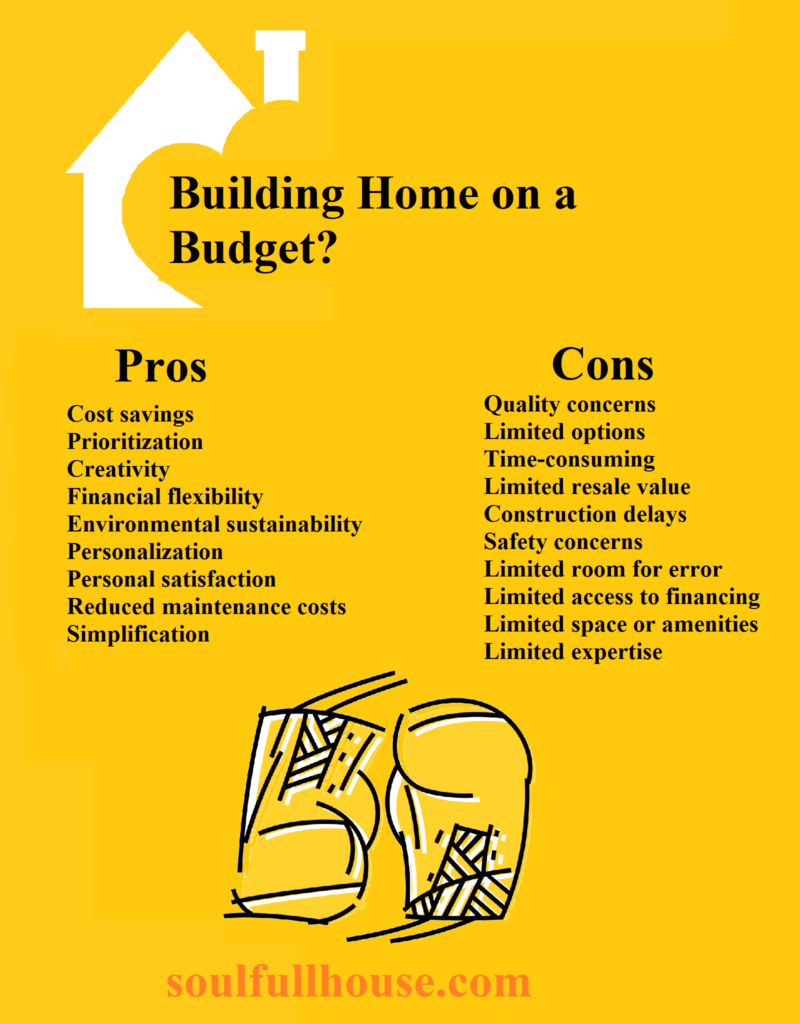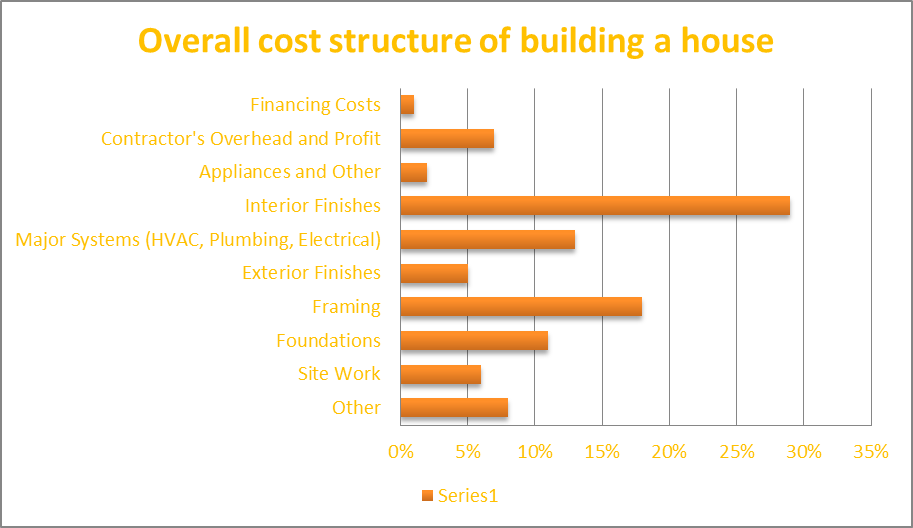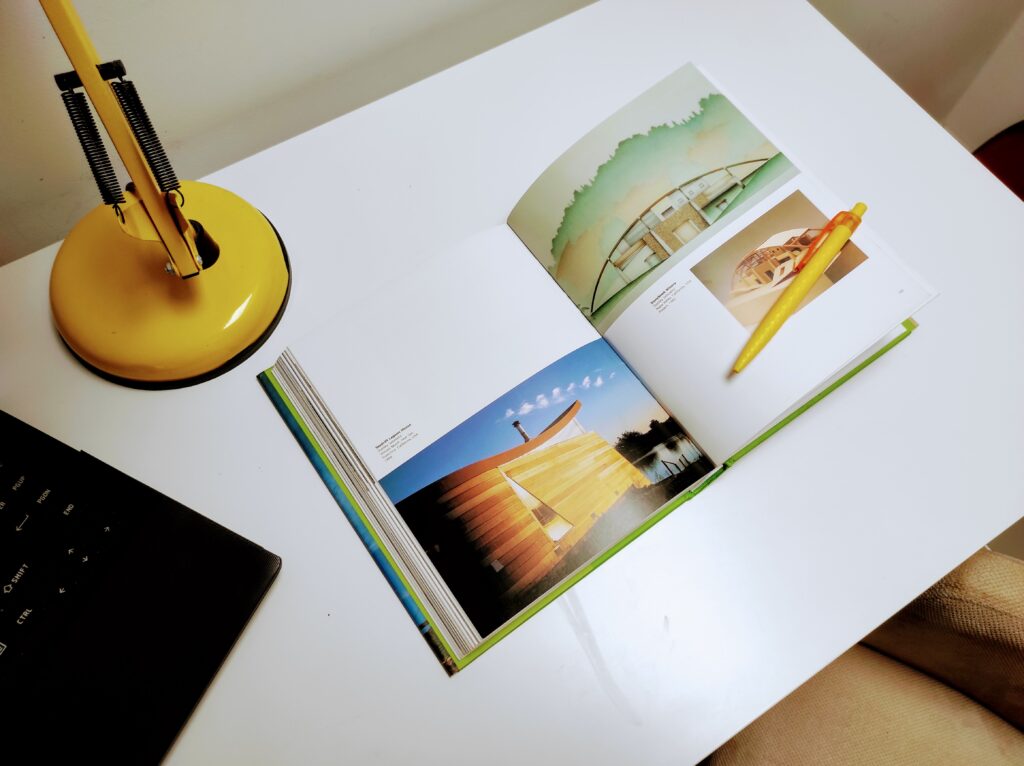Of course, finding ways to save money is a priority when you building home on a budget, which is the case for the majority of people who opt to build their own house. We also cover it in dozens of our blog posts. Yet, the question is if it just provides benefits. Is it possible that we may eventually end up losing more than we gained? This analysis is addressed in this article with the goal of providing you with the big picture in order to motivate you to make bold decisions.

What are the benefits of building a house on a budget?
There are several benefits of building a house on a budget: obviously – cost savings, more prioritization, higher creativity, financial flexibility, environmental sustainability, personalization, financial flexibility, personal satisfaction, reduced maintenance costs and simplification.
Pros:
- Cost savings: Building a home on a budget and saving money on construction costs is a benefit by itself. By carefully managing expenses and selecting cost-effective materials and design choices, homeowners will keep their expenses under control much more effectively simply because they have to.
- Prioritization: When building on a budget, homeowners must prioritize their needs versus wants. This can help them make more thoughtful decisions about their home design, and ensure that they focus on the elements that are most important to them.
- Creativity: Building on a budget can encourage homeowners to be creative and resourceful in their design choices. They may be more likely to consider alternative materials or unique design solutions to meet their needs without breaking the bank.
- Environmental sustainability: By prioritizing sustainable and energy-efficient materials and design choices, homeowners can build a home that is more environmentally friendly and can save them money on utilities in the long term.
- Personalization: Building on a budget can encourage homeowners to take a more hands-on approach to their home design and construction, allowing them to personalize their space to their unique preferences and needs.
- Financial flexibility: In order to build on a budget and allow themselves to stay within their financial means and avoid taking on excessive debt homeowners often must find alternative ways of financing. Although it is more difficult to do than to say, it will result in significant debt relief in the long run.
- Personal satisfaction: Building a home on a budget can provide a sense of personal satisfaction and accomplishment for homeowners who are able to successfully navigate the challenges of building within their financial constraints. I say this from personal experience.
- Reduced maintenance costs: By choosing durable and low-maintenance materials, homeowners can save money on ongoing maintenance and repair costs for their home.
- Simplification: Building on a budget can encourage homeowners to simplify their lives and prioritize what is truly important to them in terms of their home and lifestyle.
From everything listed above, I would personally single out creativity. The urge to overcome limits gave rise to architecture as an art form. Because individuals are prone to conformism, and all it takes is a spark to start a fire.

What are the drawbacks of building a house on a budget?
There are several drawbacks of building a house on a budget: quality concerns, limited options, time-consuming, limited resale value, construction delays, safety concerns, limited room for error, limited access to financing, limited space for amenities and limited expertise.
Cons:
- Quality concerns: When building on a budget, there may be a temptation to cut corners on construction materials or workmanship. This can result in a home that is not as durable or long-lasting as one built with higher-quality materials and workmanship. Therefore it is vital to research alternatives as much as possible in order to avoid compromising quality.
- Limited options: Building on a budget may limit homeowners’ options when it comes to design and materials. They may not be able to afford some of the more luxurious or high-end options that they would prefer, and this can be frustrating.
- Time-consuming: Building a home on a budget can be a time-consuming process. Homeowners may need to spend more time researching materials and design options, and may need to work with contractors who are willing to work within their budget constraints. The longer time of planning and construction is possibly the single disadvantage that cannot be avoided, in my opinion.
- Limited resale value: Homes that are built on a budget may have lower resale value than those that are built with higher-luxury materials and usual construction methods. This can limit the potential return on investment for homeowners. Yet, this does not exclude the possibility of finding a buyer with similar sensibilities and tastes to yours who is willing to pay a reasonable price.
- Construction delays: Building on a budget can result in construction delays, as homeowners may need to wait for materials or labor to become available at a lower cost. This can be frustrating for homeowners who are eager to move into their new home.
- Safety concerns: Cutting corners on construction materials or workmanship can result in safety hazards or code violations that can put homeowners and their families at risk. It is important to prioritize safety and compliance even when building on a budget.
- Limited room for error: Building on a budget requires careful planning and attention to detail, as there is less room for error or unexpected expenses. Even small mistakes or oversights can have significant financial consequences.
- Limited access to financing: Some lenders may be hesitant to provide financing for homes that are built on a budget, as they may perceive them as higher-risk investments.
- Limited space or amenities: Building on a budget may require homeowners to make sacrifices in terms of the size or amenities of their home. They may need to choose a smaller home or sacrifice some of the features they would prefer in order to stay within their budget.
- Limited expertise: Homeowners who choose to build on a budget may have limited expertise when it comes to construction and design, which can make it difficult to make informed decisions or ensure that their home is built to a high standard of quality.
Of all the above, experience teaches me that the greatest danger is the lack of room for error, and we all make mistakes.

Overall, building a home on a budget can be a good choice for those who are looking to save money and prioritize their needs. However, it is important to be aware of the potential downsides and to work with a reputable contractor who can help ensure that the home is built to a high standard of quality.
In conclusion, building a house on a budget offers several benefits, such as cost savings, prioritization, creativity, financial flexibility, environmental sustainability, personalization, personal satisfaction, reduced maintenance costs, and simplification. However, there are also drawbacks, including quality concerns, limited options, time-consuming process, limited resale value, construction delays, safety concerns, limited room for error, limited access to financing, limited space for amenities, and limited expertise. Therefore, it is essential to carefully weigh the pros and cons before embarking on a budget build and to work with a reputable contractor to ensure that the home is built to a high standard of quality. Overall, building a home on a budget can be a wise choice for those looking to save money, but it requires careful planning and informed decision-making to ensure a successful outcome.
